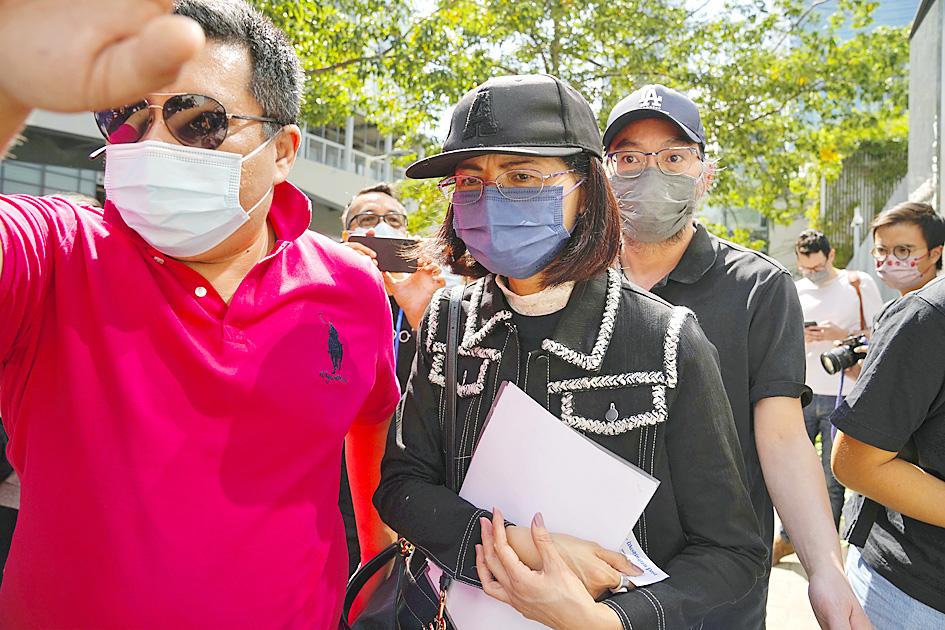The mother of a murdered Hong Kong woman yesterday blasted the authorities for allowing her daughter’s killer to live as a free man, a case that has festered because China does not recognize Taiwan.
Poon Hiu-wing (潘曉穎), 19, was pregnant when she was strangled by her boyfriend, Chan Tong-kai (陳同佳), during a Valentine’s Day trip to Taiwan in 2018.
The murder, which Chan has admitted to, sparked a chain reaction that led to huge democracy protests the following year and has been a source of embarrassment for the Hong Kong government.

Photo: AP
Poon’s mother — who has never revealed her name — held an emotional news conference outside the government headquarters yesterday, calling on authorities to either fly Chan to Taiwan or prosecute him locally for murder.
“The Hong Kong government believes that this felon, who can kill again at any time, is fit to walk the streets and threaten people’s lives,” she told reporters.
Chan had “never faced consequences for murder,” she said, after it was revealed earlier this month that he had left police protection and was free to live a normal life.
Hong Kong prosecutors said that they had no jurisdiction to try him for murder. They also declined to send Chan to Taiwan.
After Poon’s murder, the territory tried to pass a law that would allow extraditions to both Taiwan and mainland China, but that sparked protests by Hong Kongers who feared that the law could see them disappear into mainland China’s opaque courts.
Those rallies soon morphed into huge and often violent democracy demonstrations, which convulsed the territory for seven straight months in 2019.
Chan served a short jail sentence in Hong Kong on money laundering charges, as he was in possession of Poon’s credit card on his return from Taiwan. It was during those proceedings that he admitted to killing her.
Chan previously said via an intermediary that he was willing to face justice in Taiwan, but no steps have been taken by him or the Hong Kong authorities to make that happen.
Taiwan and Hong Kong have blamed each other over the impasse.

Japanese footwear brand Onitsuka Tiger today issued a public apology and said it has suspended an employee amid allegations that the staff member discriminated against a Vietnamese customer at its Taipei 101 store. Posting on the social media platform Threads yesterday, a user said that an employee at the store said that “those shoes are very expensive” when her friend, who is a migrant worker from Vietnam, asked for assistance. The employee then ignored her until she asked again, to which she replied: "We don't have a size 37." The post had amassed nearly 26,000 likes and 916 comments as of this

US President Donald Trump said "it’s up to" Chinese President Xi Jinping (習近平) what China does on Taiwan, but that he would be "very unhappy" with a change in the "status quo," the New York Times said in an interview published yesterday. Xi "considers it to be a part of China, and that’s up to him what he’s going to be doing," Trump told the newspaper on Wednesday. "But I’ve expressed to him that I would be very unhappy if he did that, and I don’t think he’ll do that," he added. "I hope he doesn’t do that." Trump made the comments in

Tourism in Kenting fell to a historic low for the second consecutive year last year, impacting hotels and other local businesses that rely on a steady stream of domestic tourists, the latest data showed. A total of 2.139 million tourists visited Kenting last year, down slightly from 2.14 million in 2024, the data showed. The number of tourists who visited the national park on the Hengchun Peninsula peaked in 2015 at 8.37 million people. That number has been below 2.2 million for two years, although there was a spike in October last year due to multiple long weekends. The occupancy rate for hotels

A cold surge advisory was today issued for 18 cities and counties across Taiwan, with temperatures of below 10°C forecast during the day and into tonight, the Central Weather Administration (CWA) said. New Taipei City, Taipei, Taoyuan and Hsinchu, Miaoli and Yilan counties are expected to experience sustained temperatures of 10°C or lower, the CWA said. Temperatures are likely to temporarily drop below 10°C in most other areas, except Taitung, Pingtung, Penghu and Lienchiang (Matsu) counties, CWA data showed. The cold weather is being caused by a strong continental cold air mass, combined with radiative cooling, a process in which heat escapes from